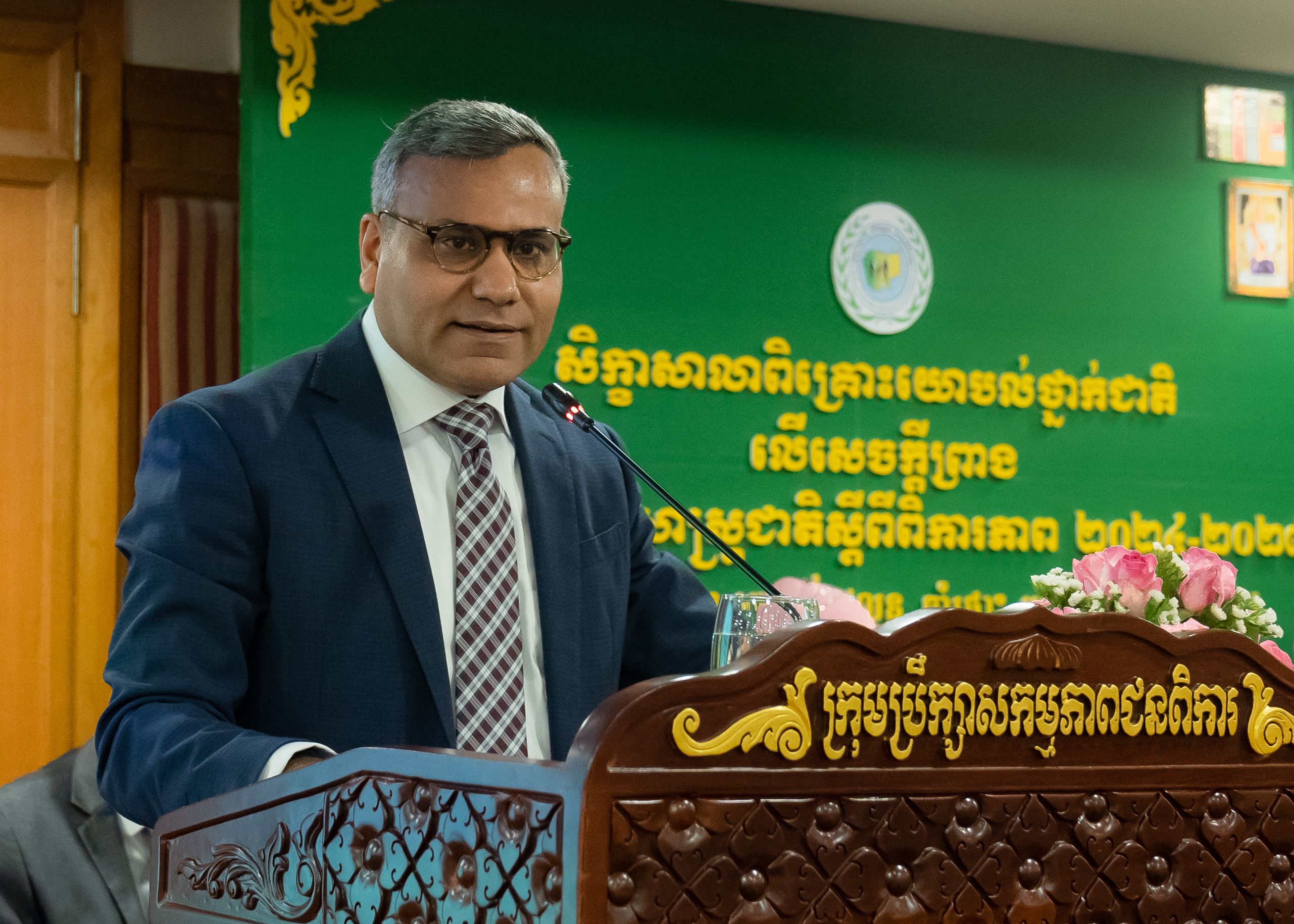Opening Remarks by Shakeel Ahmad, Deputy Resident Representative, UNDP Cambodia
Consultation Workshop to Validate the National Disability Strategic Plan 2024-2028
March 26, 2024

His Excellency Met Makara, Representative of Minister of Social Affairs, Veterans and Youth Rehabilitation (MoSVY) and President of Disability Action Council (DAC)
His Excellency Ung Sambath, Acting Secretary General of Disability Action Council
Ms. Cai Cai, Chief of Gender Equality and Social Inclusion Section, Social Development Division, UNESCAP
Excellencies, colleagues, persons with disabilities, the media, distinguished guests,
Good morning/arun so-sdei
It is my pleasure to join you all today. I would like to extend a warm welcome to all participants joining the national consultation for the validation of the National Disability Strategic Plan 2024 – 2028 (NDSP3). The workshop aims to collect insights and perspectives on the draft version that has been in progress since last year. For UNDP, we see this important strategic document to be one for and formulated by persons with disabilities and their representative organizations. Indeed, UNDP has included disability as a cross-cutting issue in all the three shifts of the UNDP Country Programme Document 2024-2028. Therefore, I am very pleased to see here many representatives from organizations of persons with disabilities, provincial disability action councils, relevant line ministries, CSOs, development partners, and other UN agencies collectively working to advance the rights and meaningful participation of persons with disabilities.
Today’s workshop marks another milestone of Cambodia’s efforts to meet its obligations under the United Nations Convention on the Rights of Persons with Disabilities. This includes ensuring and promoting the full realization of all human rights and fundamental freedoms for persons with disabilities, without discrimination of any kind whatsoever on the basis of disability. This ambition is well aligned with the Pentagonal Strategy’s commitment relating to (and I quote) “Cambodian people live in dignity and happiness and enjoy equal access, equal rights, and equal opportunities in the society.”, unquote.
To support Cambodia in this endeavour and to ensure that the rights of persons with disabilities are recognized, UNDP works in close collaboration with the Ministry of Social Affairs, Veterans and Youth Rehabilitation, and the Disability Action Council, to implement the Convention on the Rights of Persons with Disabilities (CRPD). This collaboration includes assistance in developing national disability law and preparing the state report for the Committee on the Rights of Persons with Disabilities. The draft National Disability Strategic Plan 2024-2028 (NDSP3) was developed in close consultation with the Organisation of Persons with Disabilities (OPDs) and relevant stakeholders through various bilateral consultations, workshops and discussions. There are seven focus areas that are aligned with the CRPD and SDGs, that have been identified for consideration. They are: employment and economic security, health and well-being, education and lifelong learning, social protection, inclusion and accessibility, safety, rights and justice, and risk and climate change.
Excellencies, Distinguished Guests, Colleagues, Ladies, and Gentlemen
For over a decade, UNDP has been closely working with national institutions to support Cambodia’s journey towards human rights, disability inclusion and to leave no one behind through developing national capacities and providing technical assistance to legal reforms. Our collective efforts have yielded significant results, marking substantial progress on multiple fronts, particularly in recent years. I would particularly note the development of a draft NDSP3.
We acknowledge that there were obstacles in evaluating the complete progress of implementing the National Disability Strategic Plan 2019-2023 (NDSP2) due to difficulties in acquiring quantitative data. It is however important to address the ongoing challenge of aligning indicators in the M&E Framework with the management data/information systems of line-Ministries, agencies, and other service providers in order to accurately measure progress. Therefore, enhancing the M&E system should be a priority for the success of the NDSP3.
Excellencies, Distinguished Guests, Colleagues, Ladies, and Gentlemen
I would like to conclude by thanking the Ministry of Social Affairs, Veterans and Youth Rehabilitation, the Disability Action Council, government ministries, the UNPRPD, Australian Government, UNESCAP, UN agencies, and the disability community for their collaboration with us in this initiative. I also thank you all for your participation in today’s workshop. I look forward to your ideas and input for furthering the rights of persons with disabilities.
I wish you all a successful workshop.
Thank you. Saum Orkun.

 Locations
Locations



